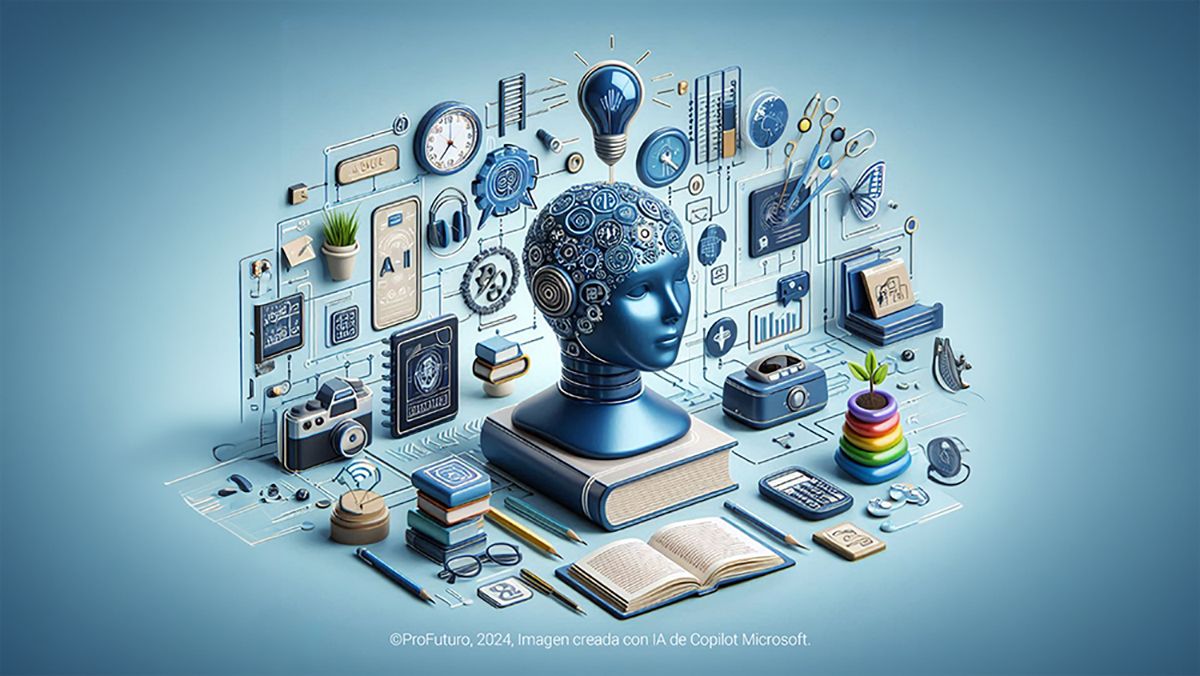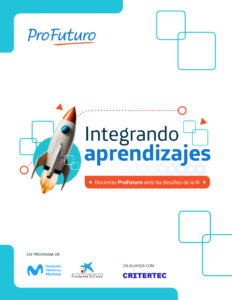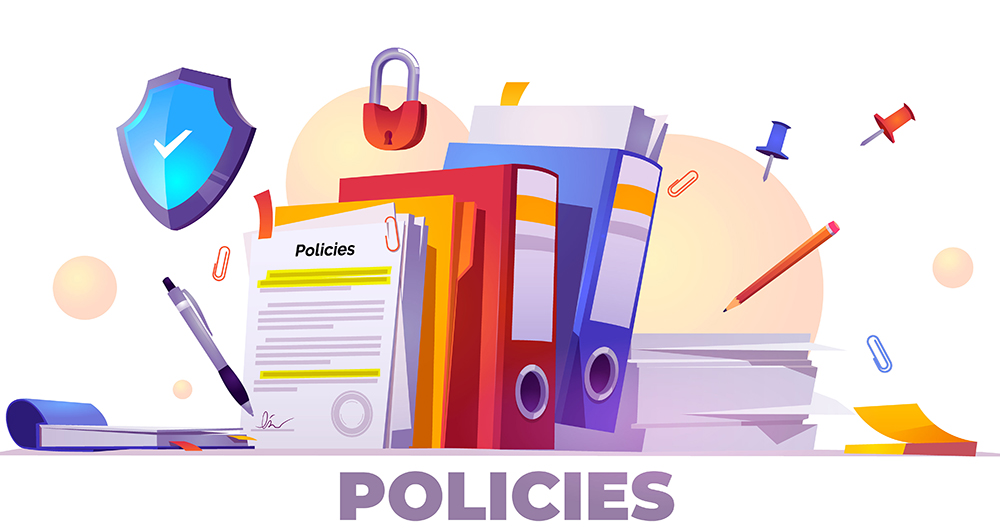In the process of integrating Artificial Intelligence (AI) in education, teachers play the most crucial role. Their enthusiasm for leveraging new technologies blends with legitimate concerns that reflect the realities and challenges of teaching today. Many teachers recognise the potential of AI to personalise learning and increase efficiency in assessment, but they also express concerns about how these tools might affect their traditional pedagogical methods and classroom dynamics.
Throughout 2023, Fundación Telefónica Movistar Colombia sought to address this challenge, exploring the intersection of education and AI through five virtual events focused on critical areas for educational development within the ProFuturo Programme. From these meetings emerged Docentes ProFuturo ante los desafíos de la IA, a publication that gathers insights on how AI can positively impact various areas of education, from pedagogy to administration. The publication also compiles educational resources, such as tutorials, podcasts, pedagogical guides, and case studies, designed to help teachers integrate AI into their teaching practices.
Docentes ProFuturo ante los desafíos de la IA gathers insights on how AI can positively impact various areas of education, from pedagogy to administration.
Evaluating with Purpose
How can we assess a student with the technology currently available? We know that with the advent of Artificial Intelligence, it is necessary to transform pedagogical practices, assessment strategies, and guide students in their understanding and daily use of AI to enhance learning processes.
This pedagogical experience offers a series of resources that will enable teachers to transform the culture of assessment in the classroom through a formative assessment approach, to make the most of Artificial Intelligence, and to promote students’ autonomy and self-regulation during learning processes.
The resources are grouped around two main axes:
- The culture of formative assessment: Includes explanations on what it is, how to apply it, and why it is important.
- Formative assessment with AI: Teaches how to leverage AI to design innovative learning experiences and create assessment rubrics.
These resources are offered in various formats, such as videos, podcasts, training guides, and tutorials, to facilitate access and application in diverse educational contexts.
AI for the Classroom: A Possible Mission
In this national ProFuturo teachers’ meeting, responses were addressed to some of the inevitable questions that arise when a new technology appears in the classrooms. To answer these concerns, several resources have been developed and offered, grouped under three key themes:
- Learning about AI: This category includes tutorials, pedagogical guides, and podcasts that provide basic notions about artificial intelligence and explore its various possibilities in the educational field. These resources are designed to familiarise teachers with fundamental AI concepts and how they can be applied to improve teaching and learning.
- Learning from AI: Here, the resources focus on discovering and using AI-guided educational platforms. These tools can enhance student learning by offering personalised and adaptive experiences that respond to their individual needs. Teachers learn to identify and use these platforms to enrich the educational process and maximise the positive impact on student performance.
- Learning with AI: This theme teaches teachers to apply Artificial Intelligence directly in the classroom to promote collaborative learning. Through projects that respond to everyday needs, students can work together using AI tools to solve real problems, thus fostering collaboration, creativity, and critical thinking skills.
Data and AI: Informed Educational Management
AI can transform how educational institutions manage and use information, providing advanced tools for data analysis and generating accurate statistics.
In this educational meeting with national educational institution leaders, the possibilities offered by AI for analysing data in the educational field and making informed decisions to improve the quality of education were explored.
This chapter offers resources to learn how to analyse databases to generate statistics with variables such as dropout, failure, and pass rates. These statistics are fundamental for identifying trends, problems, and areas of opportunity within educational institutions.
Additionally, a newsletter structured in five steps is offered to create an improvement plan for an educational institution with the help of AI. This practical guide helps institutions implement data-driven strategies, promoting more efficient and effective management.
Empathy: Learning about Emotions in the Digital Age
Can we use AI to enrich and deepen students’ emotional and socio-emotional experiences? Are there tools to address emotional education in the digital age?
This meeting was organised around two major themes: Emotions in the AI Era, where the resources offered allow us to learn about emotions from a historical and cultural perspective and, even with a tutorial, we can learn to program a generative text AI to create emotive conversations that help us better understand our emotions and those of students. The second theme, Socio-emotional Experiences with AI, offers resources to design socio-emotional experiences for students.
What do Colombian ProFuturo teachers think about using AI?
Finally, the publication presents the results of a survey conducted with Colombian teachers on their use of AI in their classes. Here are some of the most significant results:
- We need to take more advantage of AI for educational data analysis and management. Text-generating tools like GPT, Bard, and Bing are the most popular among teachers, indicating a clear preference for using AI as an assistant for writing and content creation. However, only 10% of surveyed teachers use AI tools for data analysis, which is essential for informed decision-making and improving the educational system. This indicates a need for teacher awareness and training on this topic.
- Teacher concern that AI might increase the digital divide.2% of teachers perceive the significant changes AI brings to education but show some fear of a potential increase in the digital divide, particularly concerning issues like unequal internet access and teacher training.
- Digital literacy, critical thinking, and creativity as learning priorities for the appropriate use of artificial intelligence. The valuation of critical and creative skills reflects an evolution in pedagogy that seeks to integrate a comprehensive educational approach, driving students to be analytical and innovative in preparation for the challenges of AI, promoting interdisciplinarity and synergy between areas such as arts and mathematics for holistic learning.
As we know, AI has unimaginable potential to revolutionise the world of education in many aspects. The challenges are also countless. There is no doubt. Therefore, it is necessary to identify topics for discussion, debate, and reflection, both individually and collectively. The document presented in this article is an invitation to that conversation, which has undoubtedly only just begun.
If you want to delve deeper, you can download it here.







